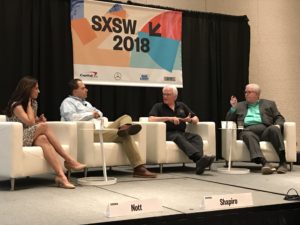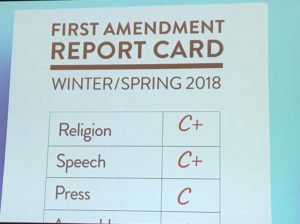
The First Amendment of the United States protects several basic freedoms including freedom of religion, freedom of speech, freedom of the press, the right to assemble and the right to petition the government. Newseum is an interactive museum based in Washington D.C. that aims to increase public understanding of the importance of a free press and the First Amendment. The Newseum Institute is the education and outreach partner of the Newseum.
On Friday, a panel on the Newseum Institute’s First Amendment Report Card was held at SXSW and hosted by Gene Policinski, the chief operating officer of the Newseum Institute, Lata Nott, executive director of the Newseum Institute, Robert Corn-Revere a partner in the Washington, D.C. office of Davis Wright Tremaine LLP, which specializes in freedom of expression and communications law and Ilya Shapiro, senior fellow in constitutional studies at the Cato Institute and editor-in-chief of the Cato Supreme Court Review.
The panelists discussed a range of first amendment issues during the panel including the modern perception of the First Amendment and where it stands in society.
Policinski said one big challenge is a lot of people don’t understand what the First Amendment protects or not. He said some people feel certain ideas shouldn’t be heard for religious or social responsibilities reasons.
“I understand that there are dangerous ideas,” he said. “I understand that people might be misled. But, the challenge in a democracy is, if you don’t like something, you don’t like the idea, use those five freedoms, which are this massive engine for change throughout our history, to get your idea out there.”
The public would make up its mind, Policinski said. He said that during the panel, the panelists also touched on ideas of what the First Amendment and freedom of speech would look like in the future.
“Social media tilts the equation, and access to the web, but we’re in a transition zone,” he said. “I’m weary of making too many decisions now, because we’re so incredibly wired, in terms of communicating with each other, more than we might have been 10 or 15 years ago. What will it be like in 20 years, if we pass some sort of restrictive things on ideas? They may be very effectively countered with not as much effort as it takes today.”
During the panel, an attendee also asked a question regarding how the FCC’s decision on Net Neutrality would have an impact on freedom of the press or free speech. Corn-Revere said he previously worked at the FCC and expressed concern for the government being in charge of the internet.
“The idea that you’ll put a federal bureaucracy in charge of this is generally a bad idea,” Corn-Revere said.

The panel also discussed Newseum’s First Amendment Report Card, which rated the First Amendment freedoms in the U.S. at a C+.
Policinski said a panel of 15 experts rate the freedoms and the score is generated with an algorithm.
“It’s come out between C+ and C-, but we’ve had people say the freedom of the press, for example, is a D-, because of the attacks by Trump,” he said. “Other people say, well, no, it’s B+, because the system is so resilient, even with his daily attacks, no laws have really been change. No reporters have been jailed, because they’re simply critical of the president. It’s an interesting process.”
Policinsky hoped those that came out to the panel took away a better understanding of the first amendment and their own feelings toward it.
“Talks like this one and programs like these are great,” he said. “It’s just getting people thinking about those freedoms, and the core values. Sometimes we take them for granted. I think one of the great lessons, watching the world, is that they can be restrained, restricted or eliminated very easily, even in what we might think is a democracy.”
Well meaning people are the greatest threat to freedom of speech, he said.
“I don’t think the biggest threat is from the dictator riding down the street,” he said. “It’s somebody who says, ‘Speech is great. Free speech is great, except for those things,’ and they name one or two things. Very sincere, they often have compelling arguments, but we can’t listen to that. We have to have all the ideas out there. I hope people take that idea away from today.”
The Newseum Institute has held a panel about freedom of speech and the First Amendment at SXSW for three years, Policinsky said. The organization was inspired to host panels like these because the attendees will be leading the future.
“This is a gathering of people, who are often tech savvy, who are maybe on the cutting edge of communications, they’re going to be the leaders in communications over the next 30, 40, 50 years,” he said. “We think it’s important for us to be here as a nonpartisan entity, to just have these discussion about these first amendment issues that society needs to think about.”
Featured Image: SXSW
